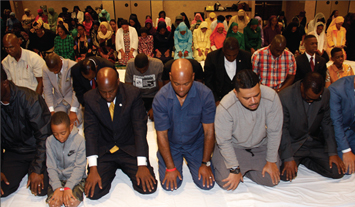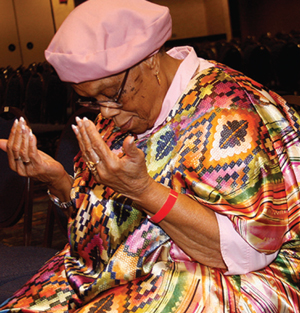Jumu’ah prayer service unites faith traditions, cultures
BYÂ MICHAEL Z. MUHAMMADÂ -CONTRIBUTING WRITER http://www.finalcall.com/artman/publish/National_News_2/article_103793.shtml#.WbRF6iQppxM.twitter
“Accept your own and be yourself.†– Master Fard Muhammad
ATLANTA—A stellar example of these words from the Great Mahdi Master Fard Muhammad, teacher of the Most Honorable Elijah Muhammad, eternal leader of the Nation of Islam crystallized during the Interfaith Jumu’ah prayer service held during the Family Summit and Conference held Aug. 25-27 at the Sheraton Hotel in downtown Atlanta. Salat-ul-Jumu’ah is the obligatory congressional prayer service of Muslims.

(L-R) Imam Sultan R. Muhammad, Quese IMC, Amatullah T. Muhammad
|

(L-R) Rev. Derrick Rice, Min. Akbar Muhammad, Ahneeahm Ben Khazriel
|
Various faith traditions brought their prayers and spiritual insight to the Friday gathering. Interfaith dialogue commonly refers to cooperative, constructive and positive interaction between people of different faith traditions. What was at the core of this interfaith gathering was the commonality that threaded its way through each faith.The program opened with Student Minister Akbar Muhammad, International Representative of Minister Louis Farrakhan and the Nation of Islam. This gathering of faith traditions and to discuss each one’s faith and how we can cooperate and get along with each other is very important, Student Min. Akbar stated during his opening remarks. “You should never be afraid of new knowledge,†he said.
Additional presenters included: Quese IMC, representing the Indigenous/Native-American community; Imam Sultan Rahman Muhammad, the Islamic community; Pastor Derick Rice, the Christian Community; Ahneeahm Benkhazriel, the Hebrew community; and Amatullah Tonantzin Muhammad, representing the Black and Mexican Islamic community as a young Muslim woman.
“We are blessed today to come first together as a family of faith. we are blessed to come together as a family honoring each other and faith traditions. It is the mortar that ties our families together,†said Sultan R. Muhammad, National Imam of the Nation of Islam. “We are blessed today to be joined and participating with our family in the Native American community, the Hebrew Israelite Community, our Christian Family, and faith tradition as well as a representative of the future of our Nation for it is in and through the women we see the establishment of our community,†he added.

Men and women from various religious backgrounds perform Salat-ul-Jumu’ah during FamilySummit and Conference in Atlanta.
|
Imam Sultan said it was an honor and blessing to be invited by the Honorable Minister Louis Farrakhan. As faith communities know, the Minister has sent out the call for our communities to come together and pray together, he continued. “So, this is a beautiful beginning to our weekend.â€
Brother Quese IMC represented the Pawnee and Seminole Nations and performed a song in his native tongue. He stated the song served ancestors who were indigenous to Georgia. He referred to Nation of Islam members as relatives. Brother Quese shared a story about FOI (Fruit of Islam, the men of the Nation of Islam) relatives who visited him in Oklahoma and participated in a sweat lodge ceremony.
“Two years ago when I first did the Jumu’ah prayer I said this is what we do in ceremony when we are suffering. We go down and hit the earth and pray hard (sajdah or prostration),†he explained.
“Imagine if we put our prayers together how beautiful and powerful it would be.†Brother Quese concluded.
Ahneeahm Ben Khazriel represented the Hebrew family. Brother Ahneeahm is lead coordinator of Operation Genesis and paraprofessional facility member at Clark Atlanta University. Opening in the Hebrew language, he gave honor to the Creator of the universe (Yah).
“When we can come together through all of our different branches and twigs and realize we have all these common spirituals roots we can produce much fruit on behalf of the Creator,†he said.
Rev. Derrick Rice, pastor of the Sankofa Baptist Church in Atlanta followed representing the Christian perspective. Pastor Rice initially acknowledged the work of student Min. Sharrief Muhammad of Muhammad Mosque No. 15 in Atlanta and Student Min. Akbar Muhammad for their work. He then began his portion of the program talking about the importance of faith. “Faith is the substance of things not seen and the evidence of things hoped for. For it to come to fruition, you must rise up and do something,†he said.
“I was reminded of my father who took me to the darkest room in the house and taught me how to develop film. I learned that darkness is a part of the process. So, as we think of the family praying together and staying together, I now see how beautiful it is, but the process to get to the beauty requires substance and evidence. You had to soak the paper in water so it would swell up and jell on the paper to begin the process,†he continued.

Woman prays during Friday congressional prayer service. Photos: Lens of Ansar
|
“So, what I offer as we prepare to pray is that while it is a wonder for us to celebrate all that is positive about this journey. We recognize it is a big deal for different faith traditions to stand up and say what few of us know. To get the picture of what God has for us as a family is singular. We have to deal with the negative images in our lives, put your feet to your faith,†he encouraged.
The final presenter was Sister Amatullah T. Muhammad, daughter of student Minister Abel Muhammad and a student at the Muhammad University of Islam in Chicago, who represented women in Islam in stellar fashion. “I come from a family that is Black, Indigenous and Latino,†she began. “My parents are Muslim but they come from Christian families and on my mother’s side we have Hebrew family. So, I see myself in this room,†Sis. Amatullah continued.
“Growing up I struggled a lot being who I am because of our disunity. I wasn’t allowed to be proud of my indigenous linage because it wasn’t Black enough, but in fact (that) made me very Black because I could understand all different parts of the Blackness,†she said. “Black is the essence of all colors. Being Mexican and dark, other lighter hued Mexicans were forced to recognize that we are the same people,†added Sis. Amatullah.
“We get so caught up in labels and titles, but if you look in God’s books, Bible and Qur’an, you don’t see God referred to as Christian, Muslim,†she observed. “We are referred to as righteous people and Believers. Righteousness is not ritual, how we pray or the language that you pray in. Rather it is obedience to His (Allah’s) will and His word and how you treat others. In Surah two of the Holy Qur’an, verse 177, it says it is not righteousness that you turn your faces towards the east and the west, but righteousness is the one who believes in Allah,†she concluded, quoting from the Islamic scriptural text.
For Sister Aanisah Muhammad from Atlanta by way of Louisiana, the prayer service was full of love, brotherhood and sisterhood. “It was family, that’s what I got from it. The reflection of the different traditions of faith all coming together representing one.â€


No Comments